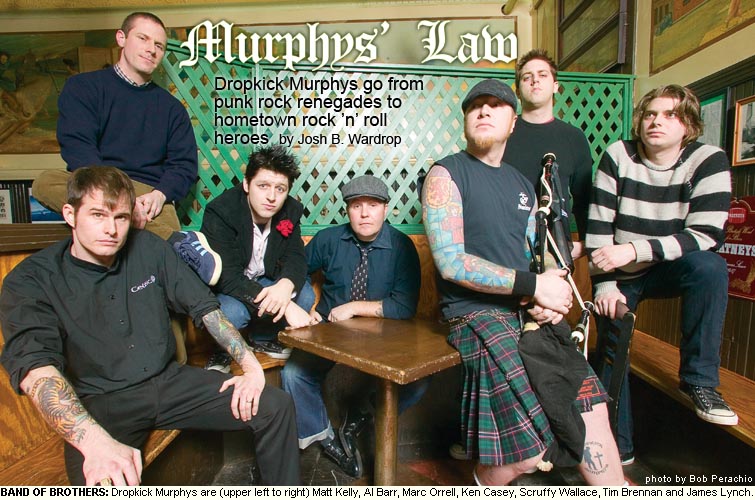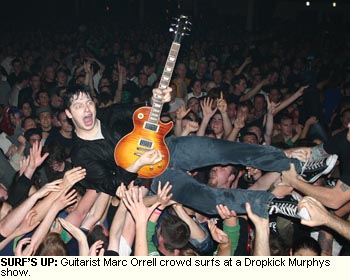
Ask Ken Casey whether he ever envisioned a day when his band Dropkick Murphys would become the hottest ticket in Boston, and he laughs incredulously. “Definitely not,” says the bassist/guitarist/vocalist and founding member of America’s—if not the world’s—pre-eminent Celtic/folk/punk rock combo. “I can still remember us playing [now-defunct punk club] The Rat back in ’97. Let’s just say it was an ugly event…we weren’t allowed back in the city for two years.”
Today, Boston wouldn’t think of turning its back on its newest homegrown rock stars. Casey, along with Dropkicks bandmates Marc Orrell, Tim Brennan, James Lynch, Al Barr, Matt Kelly and Scruffy Wallace, are the toast of the local music scene—a gang of homegrown, working-class boys from area towns like Quincy, Milton and Dorchester who’ve clawed their way to the big time through hard work and an uncompromising belief in their brand of honest, aggressive, anthemic music.
Raised on a diverse musical diet of “Boston hardcore bands and traditional Irish music our parents liked,” Casey says, “we started as a hobby. But right from our first show, the reaction we got pleasantly surprised us, and made us feel like [our sound] was the real deal.”
After paying their dues with several underground indie releases, the Dropkicks attracted the attention of Rancid frontman Tim Armstrong, who released the band’s first full-length album Do or Die on his Epitaph Records sub-label, Hellcat, in 1998. The Dropkicks quickly grew to a seven-man outfit as the sound and instrumentation of their records surpassed what they could do onstage.
“We couldn’t really reproduce our songs [live] because we didn’t have a full-time bagpiper or anyone to play the various Irish instruments,” Casey recalls. “When we recorded, we’d have someone sit in—usually a 40-something guy with a day job, like a cop or a contractor. These weren’t people we could convince to hop in a van and drive around for weeks at a time playing punk music. So, while our power and aggression came through as a foursome, we knew we wanted to go further.”
Wildly popular in Boston practically from the start, the Dropkicks won over a larger fanbase by sticking to the pugnacious working-class mentality instilled upon them growing up in Boston. “I think people from here have a little chip on their shoulder,” Casey laughs, “and we just always let that show. We saw ourselves as a sports team playing an away game—we talked smack about other cities, and in doing that I think we tapped into the same pride that everybody feels about where they come from.”
In 2004, the Dropkicks’ local and national profile increased when they provided the soundtrack to what would end up being a long-awaited World Series champion season for the Boston Red Sox: the band’s modernized remake of “Tessie,” a favorite rallying song of Sox fans back in 1903. As the team progressed further in its magical season, radio airplay for “Tessie” grew. However, Casey says the band quickly developed a strategy for not growing tired of the song.
 “We
don’t get sick of playing it, because we
hardly ever do,” he laughs. “For the most
part, we only play it in Boston, and,
frankly, if it ain’t baseball season, we
feel a little silly playing it. But we’re
proud of it—I love the mix of instruments on
it, and I think we did everything we could
with a hundred-year-old song!”
“We
don’t get sick of playing it, because we
hardly ever do,” he laughs. “For the most
part, we only play it in Boston, and,
frankly, if it ain’t baseball season, we
feel a little silly playing it. But we’re
proud of it—I love the mix of instruments on
it, and I think we did everything we could
with a hundred-year-old song!”
In 2006, a whole new audience of film fans were introduced to the Dropkicks, as the band had its rollicking sea shanty “Shipping Up to Boston” included in the soundtrack to the Academy Award winner for Best Picture, Martin Scorsese’s The Departed. The tale of Irish mobsters in South Boston was a natural fit for the Dropkicks, and was even filmed right in the band’s backyard in 2005. Despite that, it took a recommendation from Robbie Robertson, former songwriter and guitarist with legendary rock outfit The Band, to his friend Scorsese to get them included on the soundtrack.
“So, you see, our local connections did us no good at all,” Casey chuckles. “What can I say, though.…It’s totally awesome to be involved with Scorsese and such a great movie.”
Every St. Patrick’s Day, the Dropkicks come home to play a series of shows and revel in the circus that accompanies them. This time around, the band has already sold out two shows at Avalon on March 16 & 18, a special afternoon gig on March 17 at Agganis Arena—their first-ever solo arena show—and a charity acoustic breakfast in Dorchester on March 18, after which they’ll appear at the South Boston St. Patrick’s Day Parade. In between the “official” gigs, they’re expected to squeeze in exclusive club shows and radio station gigs. By the time the last Guinness has been downed, Casey admits that his Irish eyes will be more likely drooping than smiling, but he and the band are enthusiastic at the way St. Paddy’s Day and the Dropkick Murphys have become inextricably linked here in the Hub.
“It’s always an exciting time for us, because since we play so many shows in a short time, we tend to play a lot of different songs and pull out a lot of rarities,” says Casey. “We have kids from Europe who come over to these shows, and the people here in Boston take them under their wings and show them around. It’s a very cool vibe—we call it ‘a convention of miscreants.’”
Still, Casey concedes that the Dropkicks
aren’t just the soundtrack for raggedy
ruffians from Boston’s working-class
neighborhoods anymore. “In 1997, you
wouldn’t have really seen anyone [at a
Dropkicks show] but punk kids and people who
wanted to mosh,” Casey says. “Last year,
though, my wife, daughter, mom and grandma
were at the St. Patrick’s shows in the
middle of everything. These days, we’re
seeing all ages and people bringing their
kids to the shows.”

back to homepage
For more information on the Dropkick Murphys, visit www.dropkickmurphys.com.